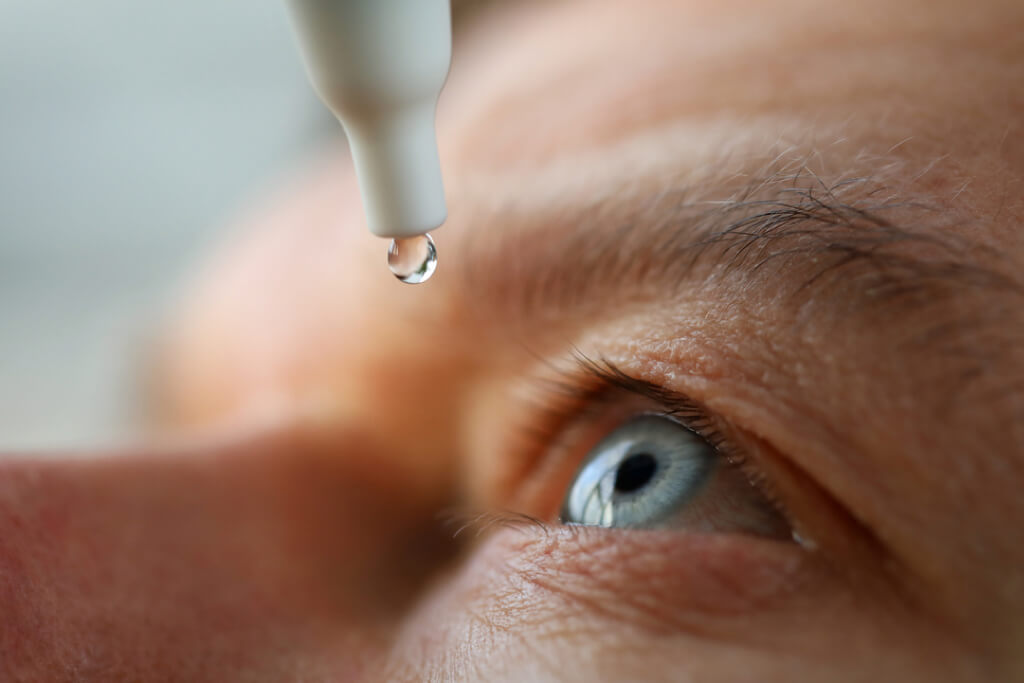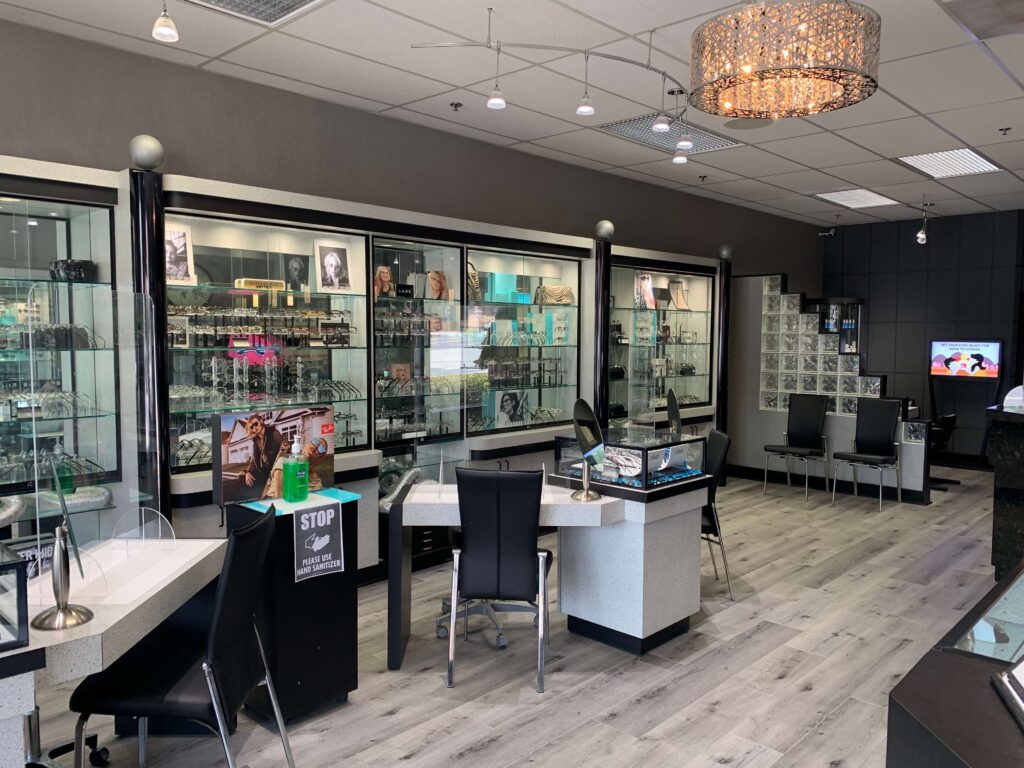What is dry eye?
Our eyes must produce tears for proper eye function and clear, healthy vision. When tear production is inadequate, the eye’s surface can become damaged and inflamed, leading to the development of dry eye syndrome. In the practice of clinical optometry, this syndrome is one of the most common ocular conditions. Characterized by uncomfortable vision, which may include burning or stinging sensations, it affects millions of patients in the United States each year.
In addition to other eye care services, including regular eye exams, vision therapy, and eye disease management, Beyond Vision Center is delighted to offer safe, comfortable, and effective dry eye treatments performed by outstanding doctors for our Encinitas community. With our care, you’ll be able to get dryness under control, and get back to the things you love most.

What are the symptoms of dry eye?
Dry eye may affect one or both eyes, and symptoms may be persistent or arise only when a patient is in certain situations, such as traveling on an airplane, exercising, or looking at a computer screen.
Dry eyes don’t only feel “dry.” For those contending with the syndrome, other symptoms may include: Stringing, burning, scratchy, or pressure sensations
Stringing, burning, scratchy, or pressure sensations
A sandy or gritty feeling
Eye redness
Increased sensitivity to light
Excess eye watering
Stingy mucus
Blurry vision
Eye strain or fatigue
Difficulty with night vision
Discomfort when wearing contact lenses
At Beyond Vision Center, we offer cutting-edge treatment and therapy to help manage and relieve these and other symptoms.
What are the causes of dry eye?
Dry eye is typically caused by a disruption of our eye’s tear film, which can lead to decreased tear production, increased tear evaporation, or reduced tear quality. Whatever the root cause, the syndrome can be effectively managed. With our expert doctors and premium care, relief is possible.

Decreased tear volume
There are several reasons why we may not produce enough tears, including age and corneal nerve desensitization due to the use of contact lenses, in addition to certain medical conditions. Reduced tear production can also be a side effect of medications like hormonal birth control. Even if you are producing enough tears, they may be evaporating too rapidly, which can also leave your eye’s surface too dry.

Poor tear quality
Your tear film is composed of fatty oils, aqueous fluid, and mucus. When there is a change or imbalance in these elements, your tears perform less effectively. Allergies, vitamin deficiencies, hormone changes, and eyelid issues may be to blame.

Underlying health issues
Tear film dysfunction may also be the result of other health concerns. Sjogren's syndrome, allergic eye disease, rheumatoid arthritis, lupus, scleroderma, graft vs. host disease, sarcoidosis, thyroid disorders, and vitamin A deficiency can all cause dry, uncomfortable vision. Be sure to share any current concerns with our doctors, even if they’re outside the realm of optometry.
How do dry eyes impact vision?

Visual health and performance
When healthy, the tear film keeps your eyes lubricated and smooth, which supports clear, comfortable vision. Tear film disruption not only leads to physical discomfort, but also impairs eye function, causing blurred or fluctuating vision. Many patients also have trouble seeing at night or are intolerant of contact lenses.

Quality of life
Well-functioning vision is a cornerstone of overall health and wellness. A patient whose eyes are severely or even moderately dry may also experience poor sleep quality, problems with concentration, and impaired mood and cognitive function, all of which can impact work, school, and other daily activities.
How to address dry eye

At-home solutions
Lifestyle changes and prevention is key to proper care for dryness. Taking breaks from your computer screen time, avoiding smoke or air blowing in your eyes, using a humidifier in dry climates, and opting for sunglasses and sun protection can go a long way in managing symptoms.

Therapeutic products
Drops and ointments can support eye care when it comes to excessive dryness. We offer a selection of excellent products at our office, and your optometrist will discuss the most appropriate products for your vision needs during your exam. We may also recommend specialty contact lenses, an area of Dr. Morgan’s specialization.

Visit our eye center
If you experience prolonged or worsening symptoms, it’s time to make an appointment with our experienced optometry experts. With our professional, compassionate treatment, you’ll be seeing clearly and comfortably in no time.
What to expect at your appointment
Our doctors will perform a comprehensive eye exam and health survey, in addition to examining the quality and quantity of your tears and screening you for other eye disease concerns.

Dry eye therapy in Encinitas
In addition to comprehensive eye care services at our Encinitas location, our outstanding eye doctors have extensive experience in the diagnosis, management, and treatment of dry eye using a range of therapeutic methods, including punctal plugs, amniotic membranes, drops, supplements, masks, lid wipes, specialty contact lenses, and more. Dr. Morgan is specialized in the fitting of specialty contact lenses and their use in the management of eye conditions including dry eye.
At Beyond Vision Center, we never lose sight of our mission: world-class optometry for every patient. Your comfort, health, and quality of life are our priority, both inside and outside of our office. Our doctors are committed to first-class eye care, and care deeply about each and every patient.
Learn more about our Encinitas eye care family
Contact us
If you’re experiencing discomfort, poor vision, or disruption in your day-to-day life due to dry eyes, contact our Encinitas, California eye center for expert support. Dry eye relief and clear, easy vision are just a click or call away. Contact us today!
Schedule appointment
More about dry eye disease at our Encinitas office
Dry eye FAQ
To keep up with your overall eye health, it is important to come in for a visit annually. However, if you notice any changes in your vision or begin to experience discomfort, schedule an appointment as soon as you can so we can make sure everything is working properly and administer proper eye care services.
If over-the-counter drops are doing the job, continue use but make sure to let us know at your next appointment! That way, we can check for any further issues while accounting for the difference made by the eye drops and discuss a new plan for your contact lenses if necessary.
If ignored, dry eye can lead to increased risk of eye infection and potential damage to the surface of the eyes.






